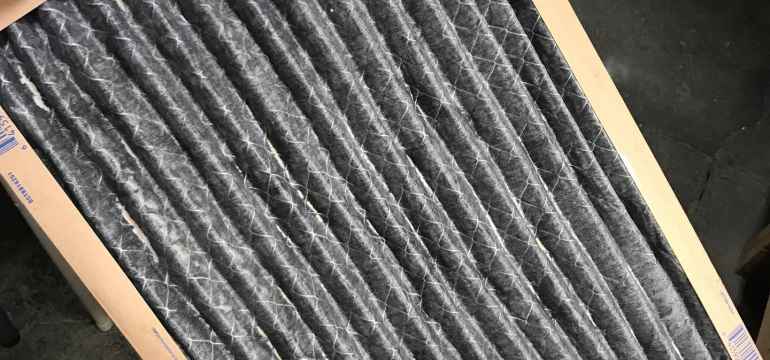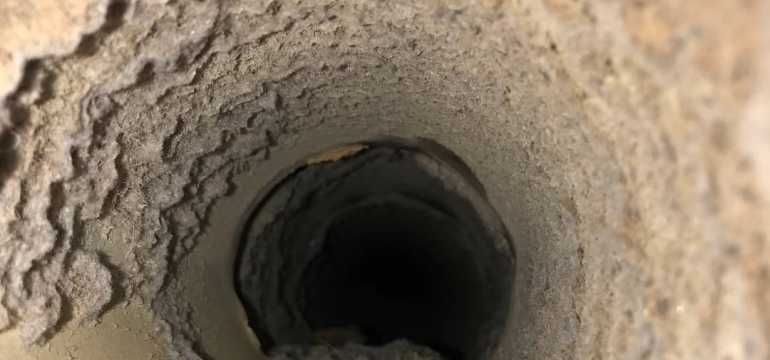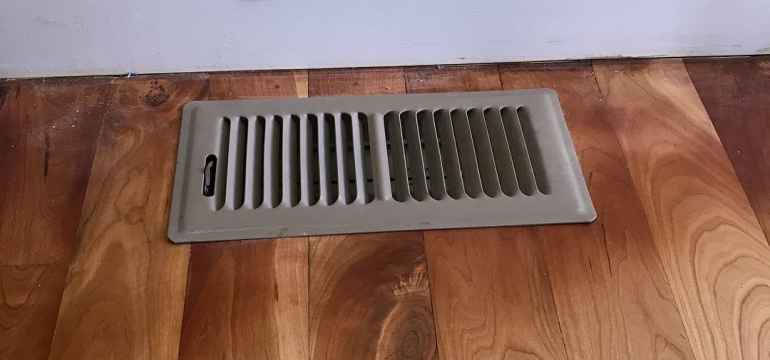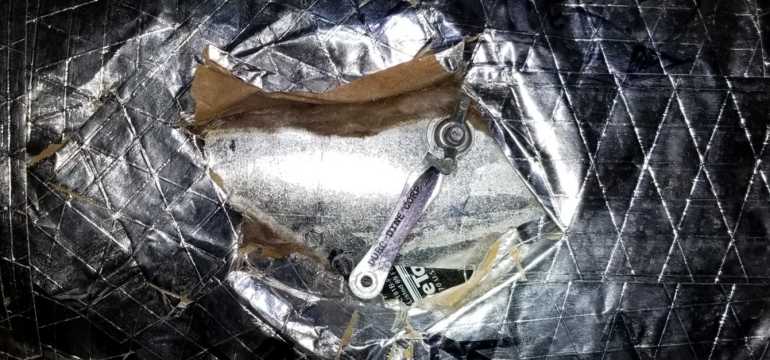There are two main reasons why your furnace makes a banging noise when it shuts off. You could either have a dirty air filter or ductwork that is blocked.
Both of these problems impact the airflow of your HVAC system. This creates backups, which leads to excess air hitting your thin metal ductwork. That causes it to bow outward, which makes a banging sound when it returns to normal.
These issues aren’t particularly serious, but they do indicate you’re not getting as much out of your heating system as you could be. We’ll tell you how to fix the problem in the sections below.
My furnace makes a banging noise when it shuts off
This is usually the sound of metal contracting.
The ductwork distributes air throughout the home by pushing it through the entire duct system and into your living areas. When the airflow is restricted, it causes the warm air to back up in your ductwork.
This heat backup causes the thin metal in your ductwork to expand while the system is on. Then, when the cycle is over, the metal contracts back into place, and you hear a banging sound.
Change the air filter

The most common solution for this problem is simply changing out your air filter. That’s why experts recommend replacing your filters on a regular schedule.
You should check them more often during winter. That’s because filters can get dirtier faster when you use your furnace more often.
Keep in mind, you need to select the correct air filter size when replacing yours. Otherwise, the incorrectly sized filter can allow excess dust to get into your HVAC system.
Check for dirty ductwork

It’s also possible that some of the dirt in your system is located in your ductwork. In that case, you would need to clean those to fix the problem.
Deposits in ductwork can hinder airflow, just like they do in your air filter. So this can also cause the metal in the ducts to expand and contract.
Another potential cause that’s worth looking into comes from the ducts under your flooring. These can sometimes get fastened too securely into place.
When that happens, a loud banging can occur when people walk across certain parts of the floor. A professional can loosen these ducts so to fix the problem, if necessary.
Clean your air registers and fan
You also need to make sure that your air registers and fan that is located within the ductwork are cleaned with some regularity. If you don’t, dirt can accumulate in it.
When that happens, the excess dirt and dust can cause a banging noise when your system shuts off. So make sure that you don’t neglect this aspect of furnace maintenance entirely.
Control the airflow in your rooms

Your HVAC system is designed to efficiently move air from one part of your house to another. Part of that is the series of registers that you have in each of your rooms.
If you keep hearing banging, it’s possible that you’ve closed too many registers and have impacted the airflow of your system. In that scenario, you could try opening up some of the registers to fix the issue.
A good strategy is to start by opening up the registers in every room in your home. When you do that, you can monitor the ambient air temperatures in each part of your house. That’ll give you a good sense of where the problem is.
Try adjusting your dampers

Ductwork is made out of thin metal that’s pretty sensitive to changes in temperature. That means another strategy you can try is adjusting your dampers. Opening your dampers up could help to improve airflow and reduce the noise you’ve been hearing.
Adjusting your dampers is a pretty straightforward process. You just need to be able to access the trunk line, which is where the individual vents branch off.
This is typically in an out-of-the-way location. Yours might be in the basement, attic, or crawlspace.
Once you find this, you should see a damper lever. This is attached directly to the duct itself.
Adjusting the damper is as easy as turning the knob either right or left.
You turn it in the opposite flow direction of the duct if you want to close it. If you need to open the damper, just turning it towards the duct should do the trick.
Keep an eye on ambient air temperatures
It’s also possible that your furnace doesn’t have any problems with airflow or dirt at all. Natural temperature changes can cause the same contractions and expansions in your ductwork.
That means the noises that you’ve been hearing could just be coming from normal changes in temperature.
You can check for this by paying attention to the ambient air temperatures in your rooms. If temperatures adjust rather quickly, it could be a sign that the problem isn’t coming from your system at all.
A good strategy is to make the changes covered above and then monitor the air temperatures in each room. That way, you can make sure that each room’s temperature is suitable for your preferences while resolving the banging noises.
Change with the seasons
Another thing to keep in mind is that airflow requirements can change with the season. For example, the airflow settings that work for you in the summer may not be a fit for your home in the winter.
Most people will need to make some adjustments to their airflow when the weather changes from cold to hot. You may need to do the same.
The best way to figure out whether you need to take this step is to monitor the temperature in your rooms. Do this over the course of three to four days for the best results.
If you notice that the temperature in one of the rooms doesn’t meet your preferences, then airflow changes may be necessary.
Make some minor adjustments
It’s important for you to know that you need to be careful while adjusting your dampers. Making a small adjustment in one of your rooms could have a big unintended impact on airflow in another part of your home.
That’s why it’s always a good strategy to start slowly and ramp up gradually. For example, don’t completely open or close your damper all of the way.
Instead, make a slight adjustment to your damper in each room. Then, check throughout your home to make sure you’re not having an unintended impact elsewhere.
If you move slowly like this, you greatly reduce your risk of creating an airflow problem you can’t figure out how to solve. And that makes it less likely that you need to pay for a professional to come out and fix your mistake.
What furnace noises are okay to hear?
You should also know that there are some furnace noises that are totally fine to hear. If you notice any of the following noises, don’t be concerned:
- A slight humming or clicking noise typically happens when the burners ignite. This is totally normal.
- Any rattling noises that you hear while the system is cooling down are typically fine unless associated with other problems.
- A chirping noise coming from your furnace is typically just a natural operating noise from its mechanisms.
- Pinging sounds can be a sign of metal contracting in your ductwork.
- Crackling noises are okay at the end of a heating cycle because the metal components are cooling.
Does all ductwork have dampers?
Another thing that’s worth noting is that not all duct systems have dampers. That means some of the instructions we’ve used so far may not work for you.
Systems that are designed with a Manual J and D load shouldn’t ever require air adjustments. These systems are designed to perform calculations that assess everything in your room — from your roof to your doors and windows.
The calculations determine how much heat and air go to each of your rooms. That’s how things should work with these systems in an ideal world.
But sometimes, the ideal scenario just doesn’t play out. That’s why many contractors will go ahead and install dampers anyway, just so you have them if you need them.
- What to Do if Your House Smells Like Gas but There’s No Leak - February 6, 2023
- Why Is There a Burning Smell Coming From My Vents? - August 16, 2022
- How to Remove the Musty Smell From Your Air Conditioner - August 16, 2022


Paul Mahoney
Sunday 5th of February 2023
Thanks for this article. It was helpful.